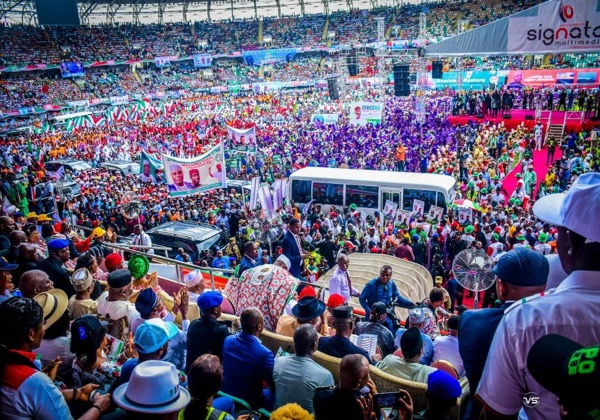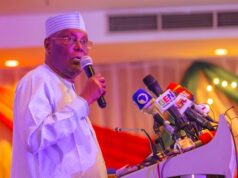By EHICHIOYA EZOMON
If campaign rallies are a winning strategy, former United States President Donald Trump would’ve won the 2020 election in a landslide, to return to the White House.
As Trump gathered huge crowds across the U.S., his challenger, Joe Biden, hardly got a couple of thousands in the few times he ventured on the campaign trail.
But based on returns in the November 3 polls, Biden secured the required 270 Electoral Votes to be president, and also defeated Trump with about eight million votes.
In Nigeria, the axiom, “If wishes were horses, beggars would ride,” is playing out in real time, as politicians use rallies as a measure of victory in the 2023 elections.
The other day, the senator representing Kano South, Kabiru Gaya, said he’d defeat his rival, Kawu Sumaila of the New Nigeria Peoples Party, in the February 25 polls.
While Gaya of the All Progressives Congress admits that Sumaila “is pulling crowd,” he says he’ll be returned to the Senate because “Kawu is doing well, but I have more crowd than him and I believe I will win the election.”
Likewise, Ogun State Governor Dapo Abiodun – taking in the crowd that graced “a solidarity walk” for the APC presidential candidate, Bola Ahmed Tinubu, and his own re-election – declares the 2023 polls as a done deal.
“This massive crowd is a sign to scare any opposition,” Abiodun said” on November 9, adding, “The walk… is intimidating. It is a show of love that you (the marchers) support Tinubu and Abiodun’s election victory in 2023.”
Similar arguments of predicting victory – on account of rally crowds – run the gamut of the major parties vying for power in the February-March 2023 General Election.
Surely, rallies are predictive of how popular a candidate or a political party is. But “rallies don’t win elections,” says Dele Momodu, director of strategic communications of the Peoples Democratic Party presidential campaign council.
Momodu, a former presidential aspirant, was reacting to the report of a huge crowd at a rally of the Labour Party presidential candidate, Peter Obi, in Asaba, Delta State.
Momodu, on Sunrise Daily, a Channels Television programme, said Obi’s popularity among the youths won’t lead to victory, as “noise” and “rallies” don’t win elections.
“We can make all the noise,… but rallies alone will not win the 2023 election,” Momodu said, referencing the Osun State governorship poll in which the LP was drubbed despite Obi stomping for the party candidate two days to the polls amid a mammoth crowd in the capital, Osogbo.
On Obi’s rally in Asaba, Momodu said: “I have no doubt that Peter Obi is a popular candidate, but don’t forget the proximity of the South-East to Delta State. They are almost one and the same.
“If you have a rally in the Delta, all you have to do is cross over from Awka, Onitsha and everywhere; these things can be arranged,” – a hint that the LP must’ve ferried attendees to the Asaba rally from neighbouring states.
But that’s a negation of the Obi campaign and its vociferous supporters’ avowal that “we don’t give ‘shi shi.'” Meaning the LP doesn’t procure its rally attendees.
However, the “ObIdients” – a mass youth movement in support of Obi’s presidential run for 2023 – deserves the plaudits for starting the new level of rallies across Nigeria.
Read also: ASUU: Of half-salary, pro-rata, six and half-a-dozen dichotomy
From June to September 2022, supporters of the 2019 vice presidential candidate of the Peoples Democratic Party conducted almost daily “Million-man” marches.
Propelled by dissatisfaction with the ruling order since 1999, the LP supporters took advantage of the APC and PDP likely resolve to observe the Independent National Electoral Commission’s timeline for campaigns, to hold rallies in cities and towns.
Dominating the media space, Obi, a former Anambra State governor, and his running mate, Yusuf Datti Baba-Ahmed, touted the rally crowds as a pointer that the February poll – and indeed the entire 2023 elections – was theirs to lose.
They’re buoyed by online polls indicating that the Obi-Datti ticket would win by a wide margin in the largely four-way contest by candidates of the APC, PDP, LP and NNPP.
But since the INEC unbanned campaigns on September 28, supporters of other political parties have organised million-man” monstrous rallies across the country.
On September 28, an APC “City Boys” political group staged a “testing-of-the-mic” rally in Abuja, at the instance of the Tinubu and Kashim Shettima presidential ticket.
It’s a mini-campaign launch, as Tinubu – expected to inaugurate the APC Presidential Campaign Council, and kick-off the campaigns – was abroad for unspecified reasons that triggered speculations he’s seriously ill.
Some tale bearers even reported that Tinubu had died, prompting him to post videos and pictures of his workouts, and meetings with aides, friends and grandchildren at his London home, in the United Kingdom.
Until Tinubu came back to Nigeria in early October, sceptics had dismissed those pictorials as photoshopped intended to hoodwink unwary and uninformed Nigerians.
Days after the Abuja APC youth rally, the party’s women marched in Lagos for the Tinubu-Shettima ticket, and re-election of Lagos State Governor Babajide Sanwo-Olu.
Then came a “5 Million-Mother-of-All-Rallies” on October 5 for the APC in Lagos – a 10-kilometre walk that lasted from 8am to 2pm – organised by the chairman of Lagos Parks and Garages Management Committee, Musiliu Akinsanya, alias “MC Oluomo,” a former chair of the state branch of the National Union of Road Transport Workers.
Two other mega rallies were to follow in Delta and Kano States, with supporters of Delta State governor and vice presidential candidate of the PDP, Dr Ifeanyi Okowa, staging a “show-of-force” at his hometown of Owa-Alero in Ika North East local government area of the state.
The rally, according to a respondent, was to awaken the community people “to the reality of their illustrious son gunning for the office of Vice President, which we pray the Almighty to sanction for us, in Jesus name.”
In Kano, a multitude of the “Kwankwasiyya Movement” and supporters of the NNPP presidential candidate, Rabiu Musa Kwankwaso – adorned in their familiar red caps – rallied for hours under the blazing sun.
Dr Kwankwaso, a former Kano governor, is challenging the hegemony of the PDP and APC in the state that produces the highest number of votes in recent elections.
To cap the “my-rally-is-bigger-than-yours,” supporters of the PDP on October 10 overwhelmed the Akpabio International Stadium in Uyo, Akwa Ibom, where former Vice President Atiku Abubakar formally launched the PDP campaigns for the February 25 presidential election.
Save the press highlighting the absence of notable PDP chieftains – particularly members of the “Group of Five” (PDP-G5) governors led by Rivers State Governor Nyesom Wike – the event resembled a coronation for 2023.
Bigger, larger and more elaborate rallies have been staged nationwide for the 2023 polls, but the “Nigerian factor” of corrupting the system has rubbished such rallies as a guide to electoral outcomes, as most people only attend the gatherings for instant financial rewards.
Hence, at the end of the rallies, participants wait behind to get their share of the agreed largesse, and those cheated outright or shortchanged by the rally organisers often cause crisis, leading to shouting bouts and/or fisticuffs.
*Ezomon, Journalist and Media Consultant, writes from Lagos, Nigeria.
- Naira appreciates by 3.3%, trades at N1,354/$ - May 6, 2024
- Shettima aborts U.S. trip as aircraft develops technical fault - May 6, 2024
- Alex Otti should publish Abia Forensic Report now - May 1, 2024










